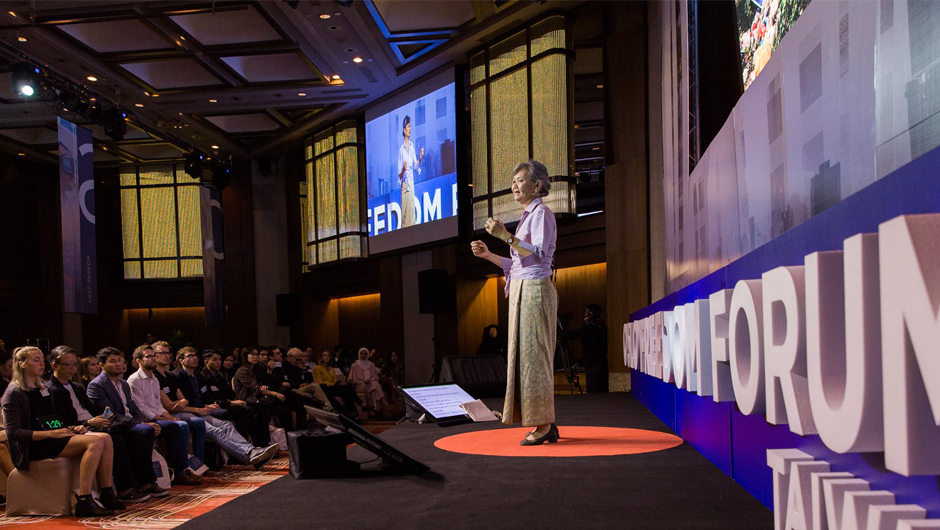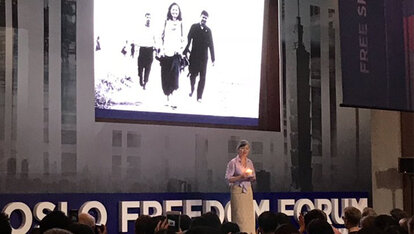Oslo Freedom Forum in Taiwan: An Inspirational Occasion

Mu Sochua, exiled Cambodian politician
©“We, the people of Cambodia, we had land. We had farms. We had what our ancestors left us. But now, things are not normal, our villagers and farmers are in trouble. We lost our land, our farms, our forests.” Up on the stage with lights out, Mu Sochua, exiled Cambodian politician, held a candle in her hands, singing a dramatic song on the unfortunate tales of her motherland. The audience was captivated. The performance on the stage excited and inspired them.
Sochua is a prominent figure from the Cambodia National Rescue Party (CNRP), a member of the Council of Asian Liberals and Democrats (CALD).
The Oslo Freedom Forum (OFF) is a transformative conference where the world’s most engaging human rights advocates, artists, tech entrepreneurs, and world leaders meet to share their stories, and brainstorm ways to expand freedom and unleash human potential across the globe. OFF has evolved from an annual flagship event in Oslo to include satellite events around the world including New York, Johannesburg, and Mexico City. Taipei became the venue of OFF’s first event in Asia on 10 November 2018. OFF has committed to be in Taipei for three years.
OFF’s event organizational style is rather unique. Experienced individuals who attend several conferences and seminars would find it quite surprising that this event is pure monologue. There is no chance for Q&A whatsoever. Sounds terrible? It is in fact quite the opposite. This is their unique style and they have done it beautifully. All the speeches are very well-rehearsed and their performances are captivating.

Mu Sochua lights a candle and sings a song
In OFF in Taipei, the audience got to listen to the political musical performance of Mai Khoi, dubbed as Lady Gaga of Vietnam. She told the story of her life, which was radically altered just because she tried to run in the elections. From the peak of her stardom, now she cannot even sing in public, so she resorts to the political movement underground.
The best performance was perhaps the one of Omar Shariff Jr., Egyptian actor, model and LGBTI activist. In 2013, he revealed he was gay and also half-Jewish, which led to his decision to leave Egypt for the United States. Sharif’s passport was revoked under the Morsi regime. The Sisi government’s increased crackdown on gay Egyptians has made it impossible for Sharif to return to his native country in the near future.
Many other interesting speakers appeared on stage, and they were really diverse in terms of where they come from and their fields of work. These included Ji Seong Ho who lost his arm and foot in the famine-stricken North Korea, and now serves as the president of Now Action and Unity for Human Rights in South Korea.
Another notable speaker was Aayat Alqormozi, a young Bahraini poet, who was arrested and tortured just for reading her work during the 2011 Arab Spring protests in Bahrain. Later on, she became a symbol of peaceful defiance against the al-Khalifa regime.
Just as noteworthy was Vanessa Berhe, a free speech activist, who began protesting against Eritrea’s human rights abuses when she was only 16 years old. After her uncle, photojournalist Seyoum Tsehaye, was imprisoned in September 2001, Berhe began campaigning for his release at her high school, and later expanded the campaign to secondary schools and universities around the world.
The list of wonderful speakers went on, which included the more positive stories of successful entrepreneurs like Bill Tai, dubbed as Elon Musk of Asia, and Mariana Dahan who presented the potential of blockchain technology to solve some of humanity’s toughest challenges like human trafficking.
What all the speakers have in common, in spite their tragic stories, was their unremitting will to fight different forms of authoritarianism in the world. They fight for their own freedom and that of their people. Their stories inspire. This is what OFF brings to the table.